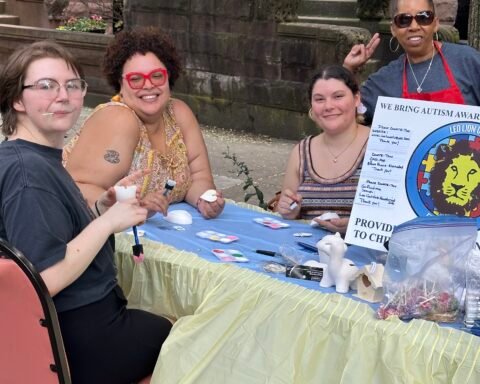This industrial metropolis an hour north of Indianapolis isn’t as well-known as Detroit, nevertheless it has change into an unlikely battleground within the conflict over electrical automobiles.
Nearly everybody you meet right here both works in a manufacturing facility, is retired from one or has a relative in a plant that makes elements for gasoline-powered automobiles — which have dominated Kokomo for almost 130 years, since a brash inventor named Elwood Haynes chugged down Pumpkinvine Pike at 7 mph in considered one of America’s first horseless carriages.
“We haven’t developed a workforce in the direction of anything but,” stated Warren Sims, a 41-year-old employee in the identical casting plant that employs his father, engaged on fuel transmission engines. “We don’t make a fuel-efficient car. All the pieces’s large and all the things prices [a lot to] gasoline and folks purchase it.”
But change is coming. Bulldozers are clearing Kokomo’s cornfields to construct a $2.5-billion government-subsidized electrical car battery manufacturing facility, with the purpose of retaining jobs tied to auto manufacturing at a time California is main the nation in phasing out gas-powered engines.
Environmentalists, together with business and authorities leaders, see a metamorphosis afoot after many years of false begins. They’ve acknowledged, nevertheless, that they will’t full the shift if electrical automobiles are considered as one thing just for wealthy liberals in California and New York. They want everybody.
The uneasy reception to EVs in Indiana — in a nationwide local weather that features Republican lawsuits in opposition to California’s new emissions guidelines and televised warnings that they characterize an assault on freedom — means that the nation stays divided over embracing a expertise that environmentalists say is important to combating local weather change.
Indiana can really feel like a tricky place to personal an electrical automotive.
Main cities are positioned far aside, with few charging stations in between. The autos that dominate the panorama — American branded pickup vehicles — are simply starting to be supplied in electrical variations. And the preferred EVs stay out of attain for a lot of shoppers in locations the place incomes are usually decrease. The charging stations on the Meijer grocery retailer parking zone in Kokomo sit empty for hours.
The state can also be deep purple. And Republicans are a lot much less doubtless than Democrats to contemplate shopping for an EV, based on a ballot performed for The Occasions by Leger, a Canadian-based polling agency with in depth expertise in U.S. surveys.
Conservative media figures have tried to amplify these divisions, portraying Biden administration credit for EVs as money for “the coastal elite who rule the Democratic Get together” (Erick Erickson) and a part of a utopian imaginative and prescient to “make kids in Africa de facto slaves to make Pete Buttigieg’s dream come true” (Charles Payne).
“They assume you’re a bunch of racists polluting the planet, so that you don’t should have actual decisions,” Fox Information host Laura Ingraham stated after California’s Air Assets Board voted to halt gross sales of recent gas-powered automobiles within the state by 2035. “It’s an effort to get you used to residing with much less — much less prosperity and fewer freedom.”
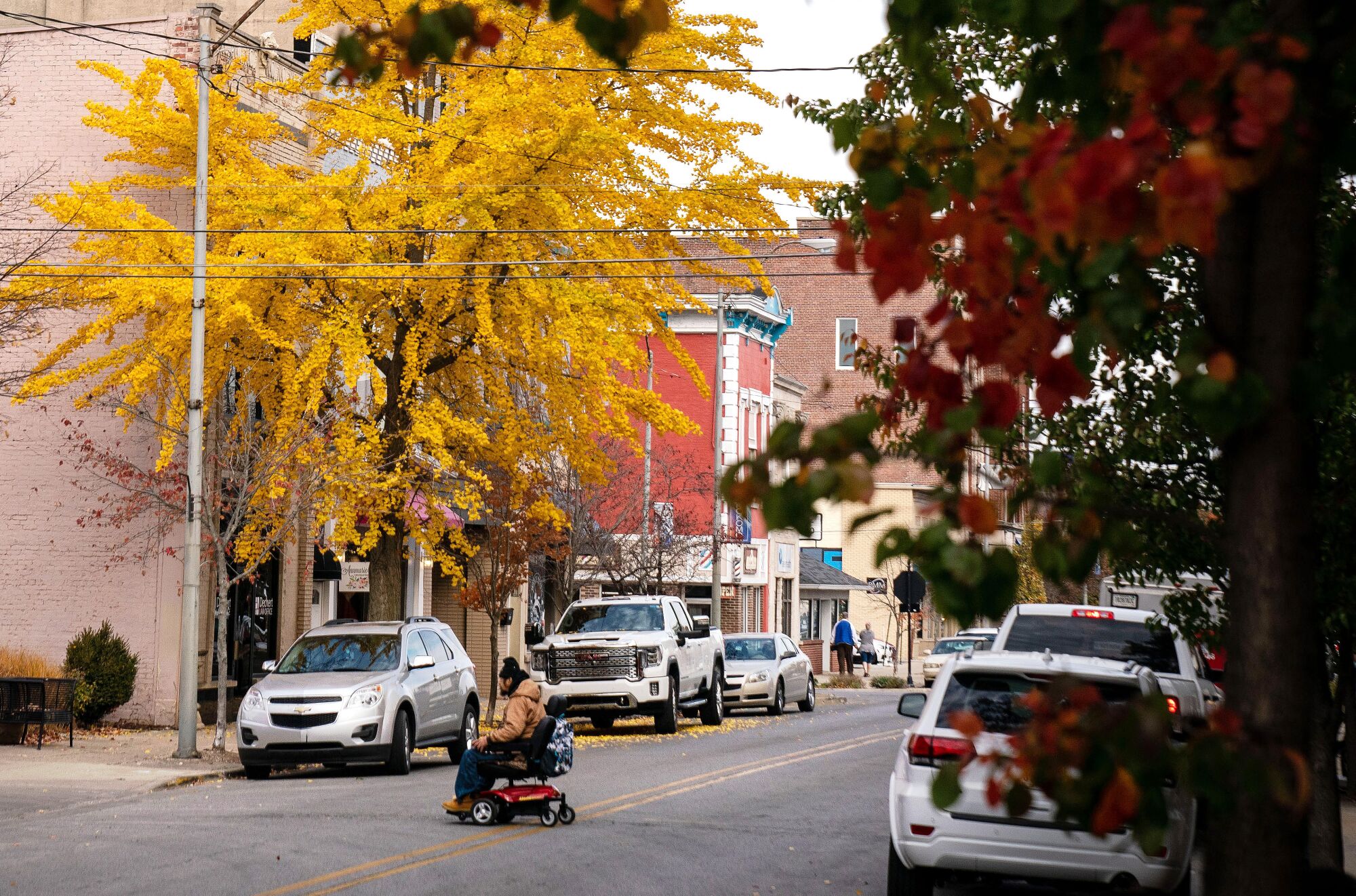
A avenue in downtown Kokomo, Ind.
(Kent Nishimura / Los Angeles Occasions)
Indiana’s Todd Rokita is considered one of 17 attorneys normal, all Republicans, suing the Biden administration in an try to dam California’s proper to set its personal emissions requirements.
“It’s gonna wreck the economic system,” Rokita stated. “The ideology is [failing], once you mandate electrical automobiles however don’t have the facility to run them.”
The Kokomo VFW parking zone is crammed with hulking vehicles, tricked-out Jeeps — and skepticism concerning the nation’s flip towards electrical autos.
“It’s silly. I don’t imagine in it, particularly the best way they’re doing it,” stated John Meeks, the 72-year-old commander of Kokomo’s Veterans of Overseas Wars Publish 1152. “They’re shoving it down your throat.”
However U.S. automakers, after resisting electrification for many years, now are betting cash and advertising and marketing clout that they will get everybody to purchase an EV, particularly as they introduce extra lower-priced fashions. And the Biden administration is spending $135 billion on a nationwide charging community, manufacturing grants, shopper subsidies and different tasks to place electrical autos on the heart of its agenda, the president’s most bold try and gradual local weather change.
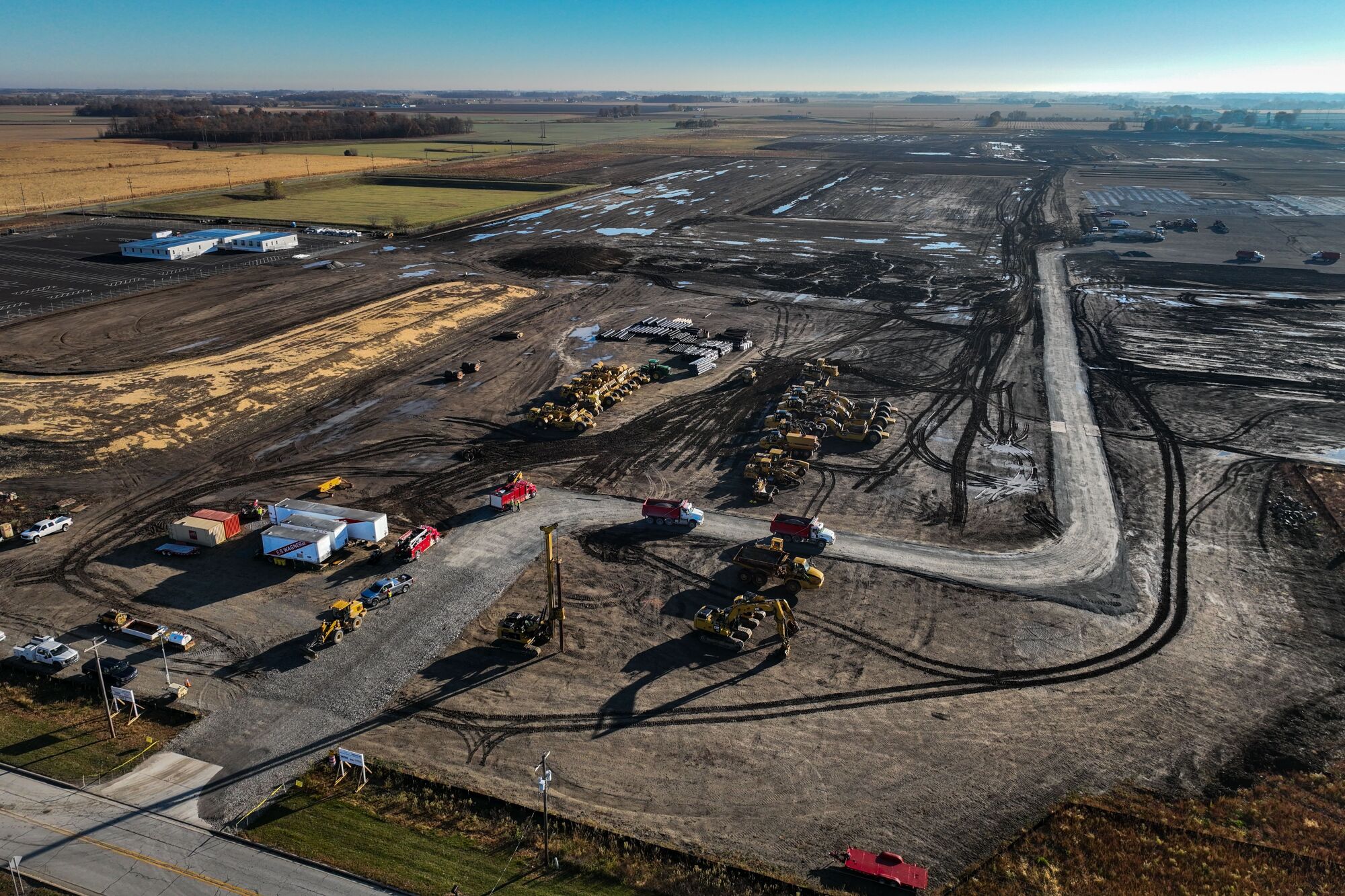
The positioning of the Stellantis and Samsung battery plant being in-built Kokomo, Ind.
(Kent Nishimura / Los Angeles Occasions)
To get there, they’ll want to draw extra individuals like Jen Cecil, a 38-year-old Kokomo workplace supervisor who owns a Mustang Mach-E.
“I’m not too loopy about, you recognize, the ‘go inexperienced’ or, you recognize, ‘you suck at life’ ” if you happen to don’t purchase an EV, stated Cecil, a Republican. “That type of will get us a foul identify. I simply actually loved the automotive.”
Whereas a lot of Indiana’s leaders aren’t cheerleaders for California’s phaseout of gas-powered automobiles, they’re keen to advertise and develop the electric-vehicle business right here: sponsoring analysis, touring to Asia to spur enterprise and handing out hundreds of thousands of taxpayer {dollars} to producers.
Kokomo Mayor Tyler Moore drives a gas-powered Jeep Cherokee and envisions a future by which fuel, electrical and hybrid automobiles coexist. However he additionally supplied tax breaks and free farmland to the three way partnership EV battery plant being constructed by Stellantis and Samsung. Stellantis, the father or mother firm of Chrysler, Jeep and Dodge, already runs 4 powertrain factories in Kokomo and a fifth in close by Tipton. Kokomo wants the roles. The encompassing county misplaced greater than 2,000 manufacturing positions from 2017 to 2021, a drop of almost 20% in that sector.
And Indiana’s Republican governor, Eric Holcomb, has given the Kokomo manufacturing facility as much as $186.5 million in incentives; he additionally met with Samsung officers in South Korea over the summer season throughout an financial improvement mission.
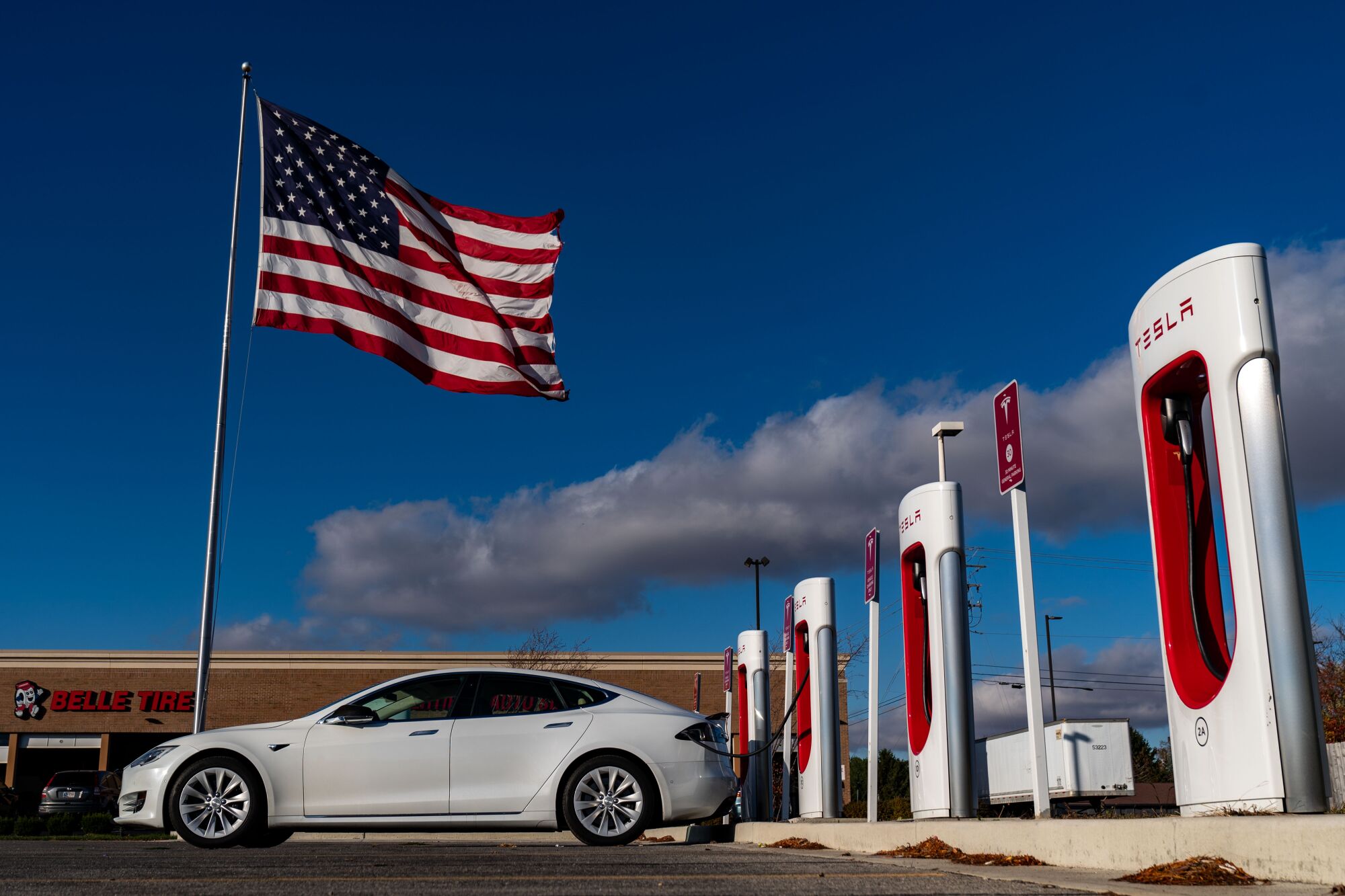
A Tesla Supercharger station in Kokomo, Ind.
(Kent Nishimura / Los Angeles Occasions)
Jodi Tinson, a Stellantis spokeswoman, stated the corporate plans to succeed in 50% EV gross sales by 2030 and is “dedicated to persevering with to offer our workers alternatives to succeed … in a daring new period.” Stellantis is investing hundreds of thousands to retool a few of its current crops to make hybrid and plug-in parts, nevertheless it’s unclear which can survive if and when the corporate goes all electrical.
The business is usually selecting to construct EVs on new websites relatively than retooling outdated ones as a result of, over time, producers will lower your expenses with extra streamlined operations, stated Zack Krelle, an analyst with TrueCar, a web site for pricing and shopping for autos.
Electrical autos ultimately are anticipated to require much less manufacturing facility labor to construct as a result of they’ve fewer elements. That could be a supply of unease for a lot of employees at Kokomo’s Stellantis crops.
“It’s extra computer systems and robots,” stated John Brumfiel, 50, who works upkeep at a transmission plant. “Much less employees.”
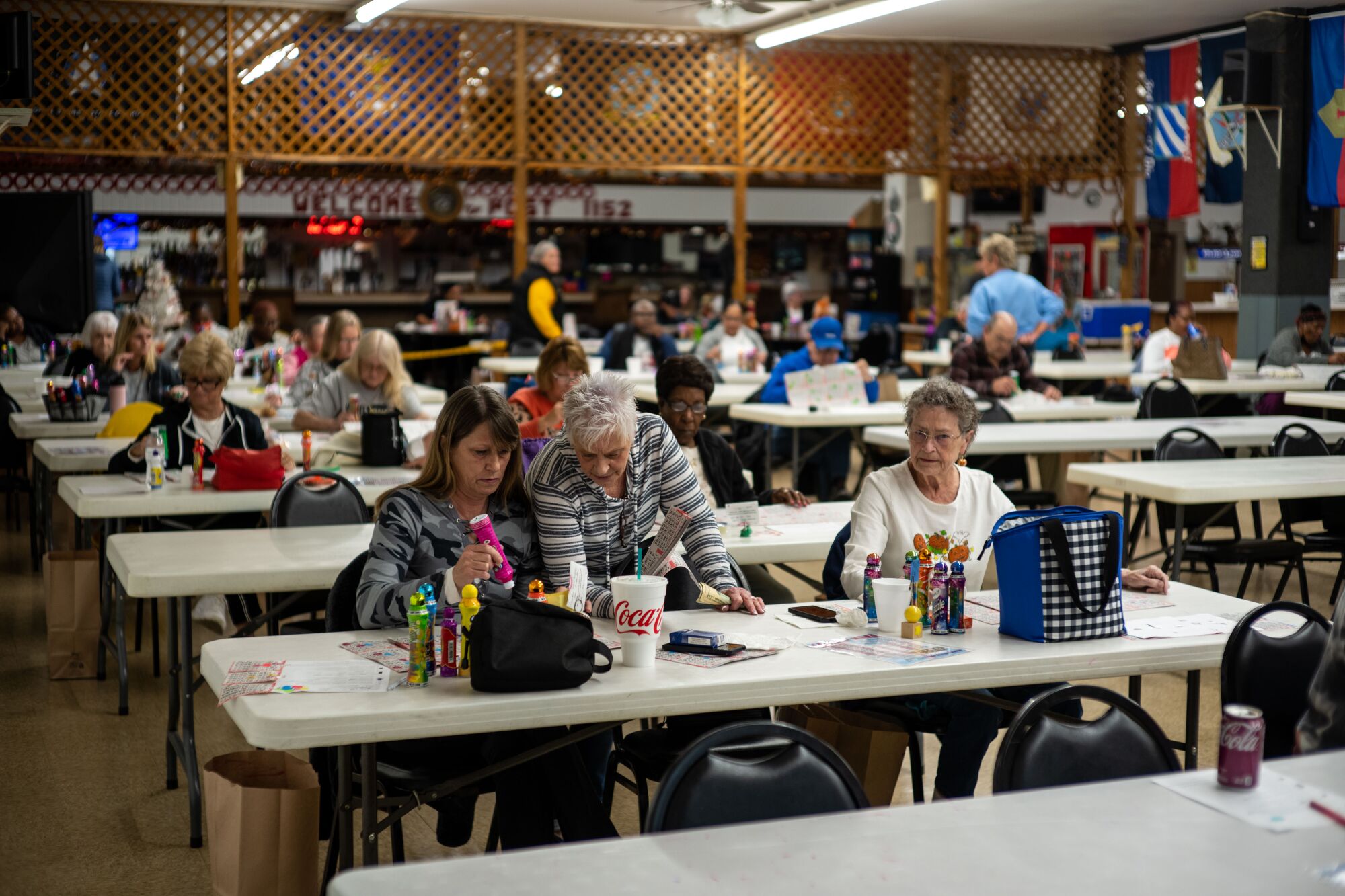
Folks play bingo on the Veterans of Overseas Wars Publish 1152 in Kokomo, Ind.
(Kent Nishimura / Los Angeles Occasions)
Hoosiers’ considerations about electrical automobiles aren’t restricted to how the autos will have an effect on their livelihoods.
On the VFW, many individuals — together with some retired plant employees — stated they weren’t able to drive an EV due to price, charging time or vary. A number of individuals on the town identified that California Gov. Gavin Newsom, a Democrat, introduced the 2035 deadline even because the state was scuffling with an vitality disaster, underscoring their considerations over reliability and with the nation’s electrical capability.
“Gavin Newsom says, ‘We need to have these battery-electric automobiles,’ ” stated David Sedam, 70, a retired Normal Motors engineer. “However then he comes out and says, ‘Oh, by the best way, don’t use an excessive amount of electrical energy.’ ”
Virginia Gov. Glenn Youngkin, a Republican whom donors and pundits have talked about as a possible presidential candidate, tried to channel a few of that skepticism when he introduced over the summer season that he needed his state to drop its adherence to California’s gasoline requirements.
“That’s simply wholly unacceptable to permit an unelected physique in California to determine what automobiles Virginians are going to purchase,” Youngkin stated in an interview a number of weeks later.
Residents of among the bluest states — California, Oregon, Washington, Hawaii and Vermont — are greater than twice as doubtless to buy electrical autos as these in redder states equivalent to Indiana and Kentucky, based on a report from TrueCar.
However even bold GOP politicians equivalent to Youngkin need to tread fastidiously on the subject of electrical automobiles.
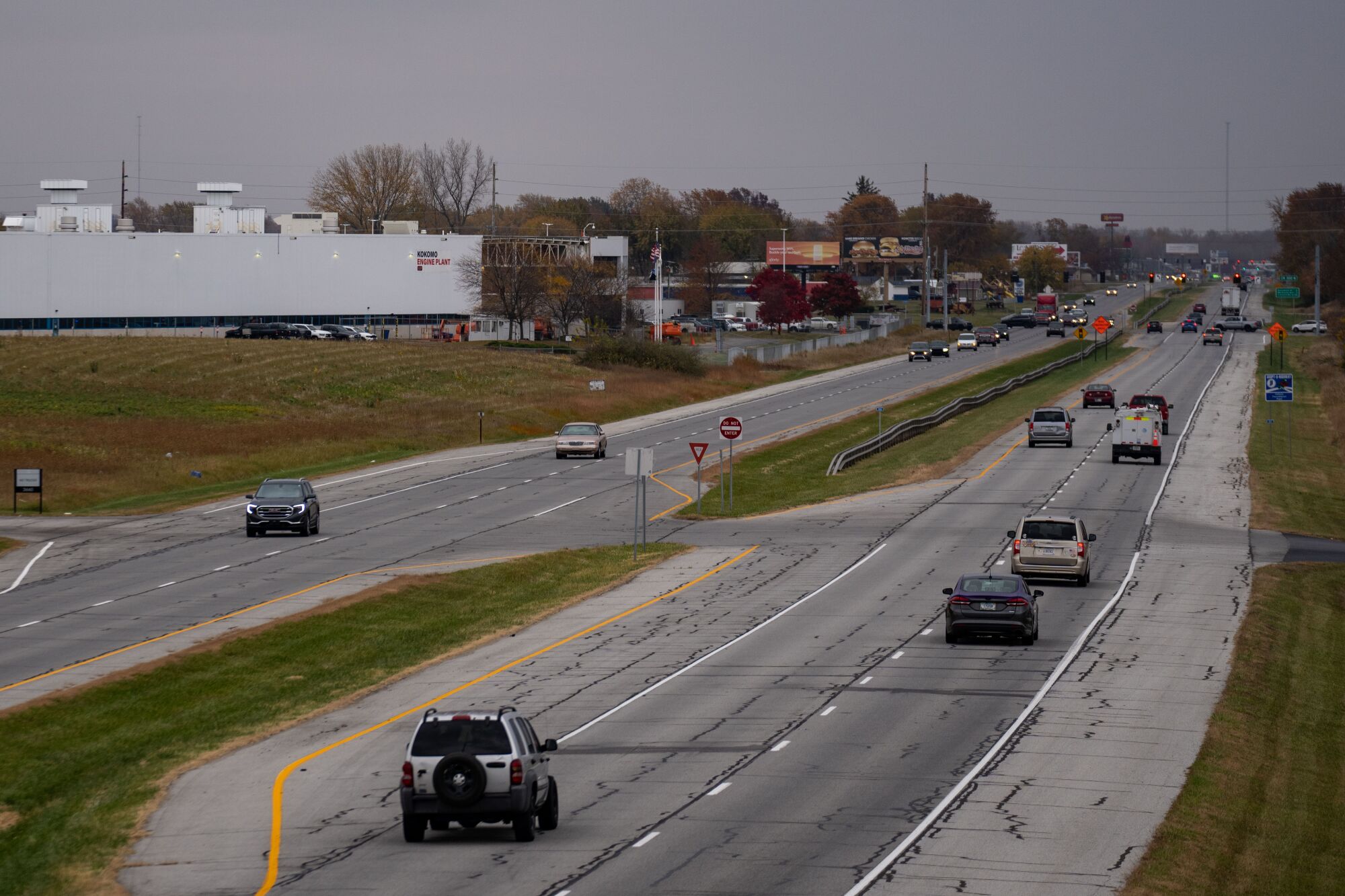
The Stellantis transmission plant sits alongside North Reed Highway in Kokomo, Ind.
(Kent Nishimura / Los Angeles Occasions)
Lots of the states that stand to get the largest enhance from the Biden administration’s funding in batteries lean Republican. In October, the administration introduced $2.8 billion in business grants in 12 states from the bipartisan infrastructure regulation. Amongst them: Tennessee, Alabama, Missouri, Georgia, Louisiana. Automotive and battery corporations are spending billions extra to construct or develop crops in North Carolina, Ohio and Kansas.
Kentucky, the house state of Senate Republican chief Mitch McConnell, is poised to make use of about twice as many individuals in EV jobs as coal mines.
Republican states fought for a decade in opposition to President Obama’s enlargement of Medicaid. However all 50 states — even the GOP ones — have already submitted plans to be a part of the nationwide EV charging community Biden introduced this 12 months. There’s little proof to date that conservative politicians would stake their political futures on the difficulty, even when they nod to anti-Biden speaking factors.
Brad Chambers, Indiana Gov. Holcomb’s financial improvement chief, doesn’t assume marketing campaign assault adverts focusing on electrical autos would have a lot of a shelf life.
“Some individuals will most likely strive it,” he stated. “In the long term, I believe it’s going to be like all the things else in our society goes to be — what’s the nice product?”
Sedam, the retired GM engineer, who drives a Chevy pickup, worries about his son and different autoworkers who nonetheless rely upon the normal business. Nonetheless, the Democrat-turned Trump voter sees electrical automobiles as the long run, albeit a extra distant one than proponents undertaking.
”I’m not in opposition to a brand new inexperienced deal, however the issue I’ve is I don’t assume we have now the expertise for the batteries to date,” he stated.
Business analysts see the partisan divide on EVs, however say age could also be simply as telling. The Leger/L.A. Occasions ballot discovered individuals between the ages of 18 and 34 had been way more doubtless (49%) to contemplate shopping for an EV than individuals over 55 (14%).
Abigail Fuller, who lives close to Kokomo in a city known as Fuel Metropolis, stated value — not politics — was her solely consideration in shopping for her Chevy Malibu.
“Fuel costs are extraordinarily costly proper now,” stated Fuller, a 28-year-old Republican. “If I may get an electrical automotive, I most likely would.”
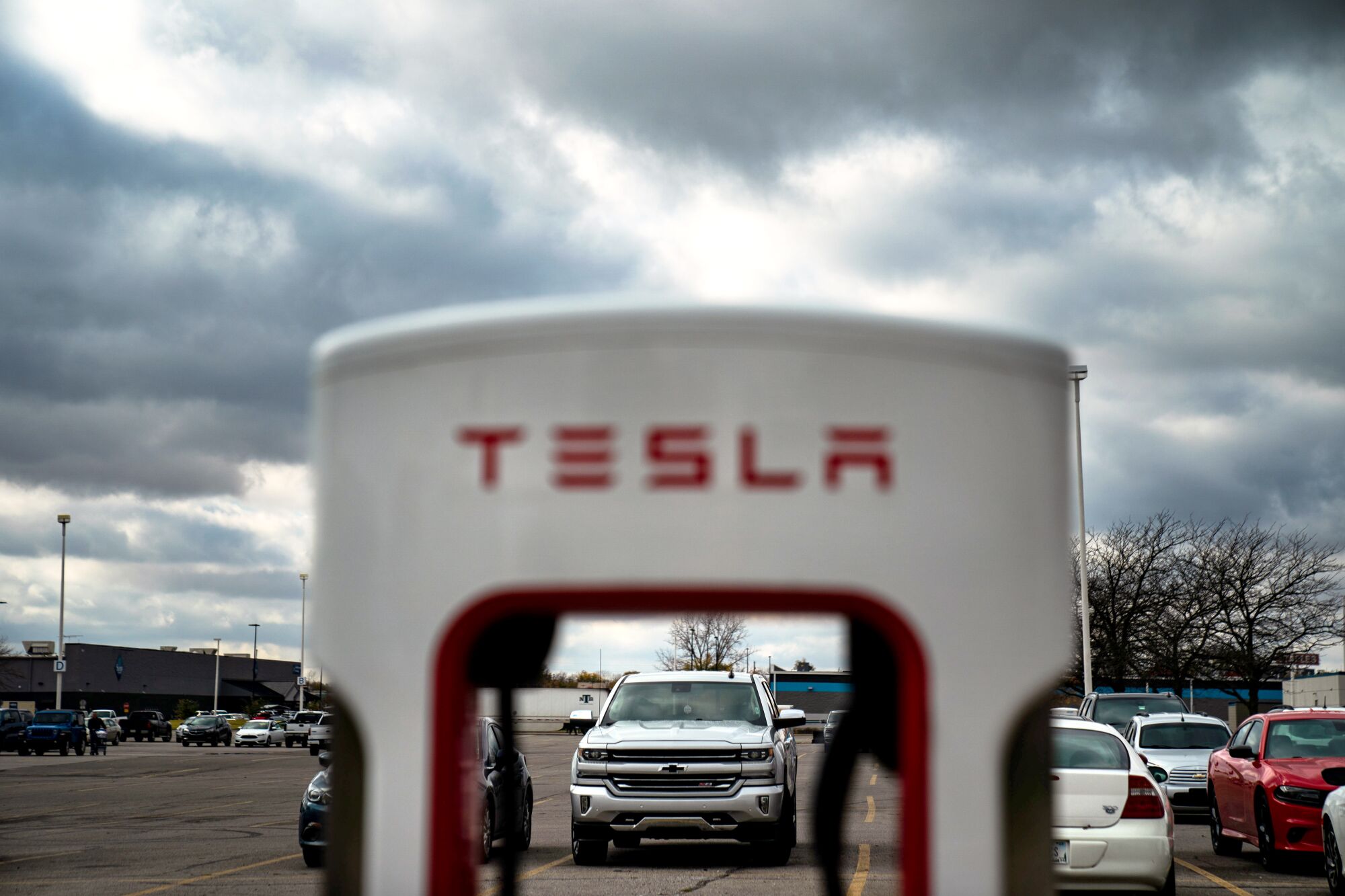
A Tesla Supercharger station in a parking zone in Kokomo, Ind.
(Kent Nishimura / Los Angeles Occasions)
This summer season, Dodge — seeking to develop the potential EV buyer base to those that like basic muscle automobiles — confirmed off an electrical idea throughout “Velocity Week” in Pontiac, Mich., with flashing lights, pounding music, billowing clouds of smoke and guarantees to interrupt the principles. The pitch was aimed immediately at overcoming the elitist tag.
“This isn’t the EV they need you to have,” Tim Kuniskis, the model’s chief govt, stated as he demonstrated the Dodge Charger Daytona SRT’s 126-decibel roar and the highly effective “Banshee powertrain.”
“We didn’t ask for the principles to alter. We didn’t need them to alter, however they did,” Kuniskis stated. “We will attempt to outrun them. However that may be a … path straight into extinction.”
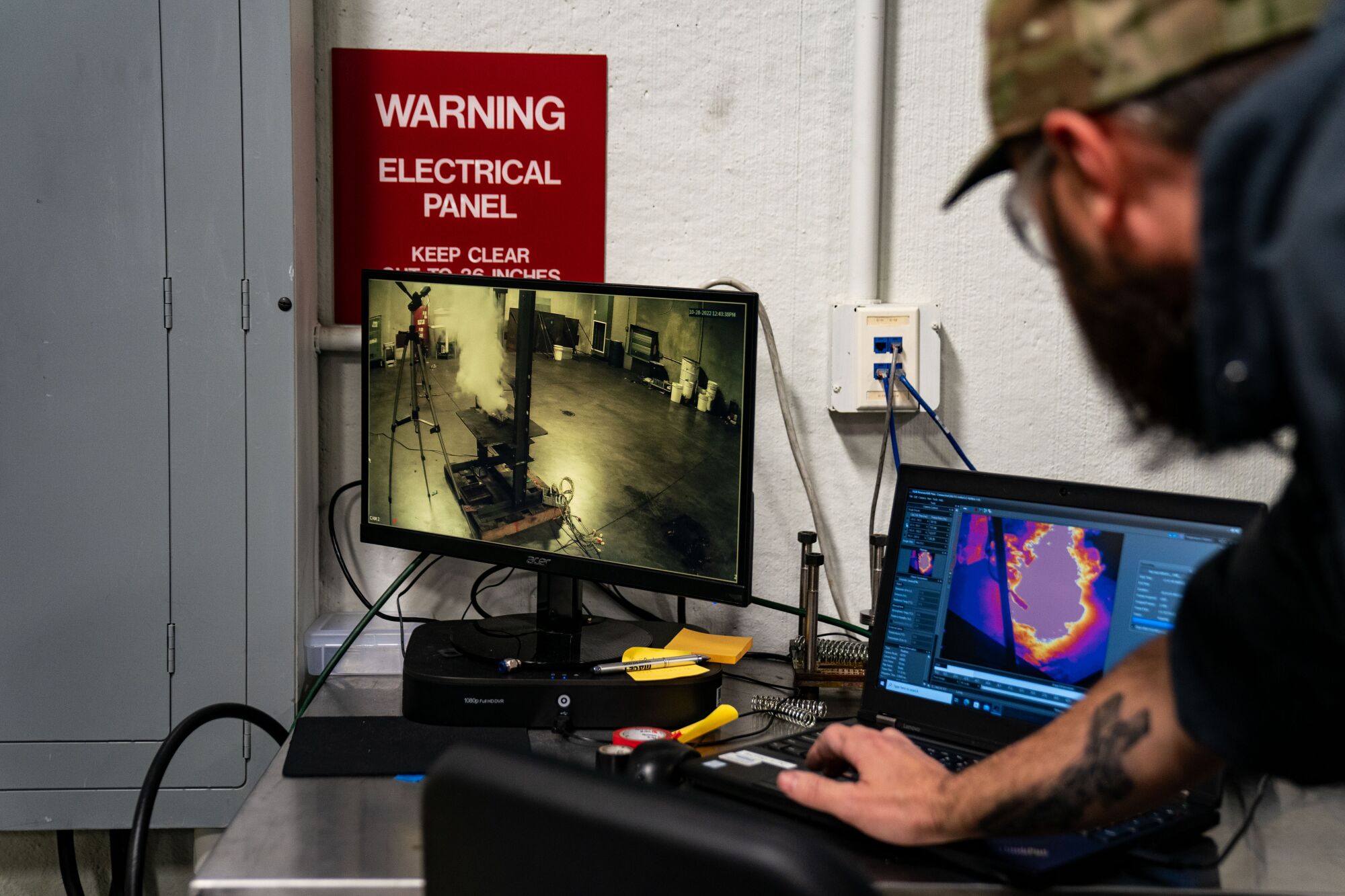
Lab technician Rodney Kidd seems at a monitor displaying a reside feed of a battery being punctured within the “increase room” on the Battery Innovation Heart.
(Kent Nishimura / Los Angeles Occasions)
Rodney Kidd, 35, has tattoos and wears a searching cap with a rifle on it. He’s a self-described rural conservative gear head. He’s additionally one thing of an EV evangelist.
The lab technician and his colleagues on the Battery Innovation Heart, about 90 minutes south of Indianapolis, are researching the way to commercialize battery expertise. Among the many greatest considerations he hears from associates when the subject of EVs comes up is that charging stations in Indiana are clustered in large cities equivalent to Bloomington and Indianapolis, making it onerous to traverse sprawling rural areas.
When that modifications, rural People’ resistance to electrical autos will too, Kidd stated.
He identified that he owns a diesel truck he makes use of for towing and pulling. Battery vehicles will do the job higher due to their superior torque, he stated. Bigger electrical autos have benefits in underground coal mines. EVs will ultimately change automotive racing too, he stated, even when a few of “the haters” could by no means settle for them.
Finally, electrical automobiles will win not due to blue state mandates, however as a result of they’re a greater product, he stated.
“There’s a divide,” he stated. “It’s not as giant as some would imagine.”

